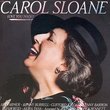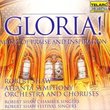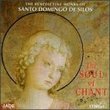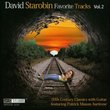| All Artists: Richard [1] Strauss, Heinrich Hollreiser, Karl Böhm, Rudolf Moralt, Vienna Philharmonic Orchestra, Lisa Della Casa, Alfred Poell, Franz Bierbach, Hilde Gueden, Paul Schoeffler Title: Strauss: Four Last Songs, Arabella/Della Casa (Vier letzte Lieder) Members Wishing: 0 Total Copies: 0 Label: Decca Original Release Date: 1/1/1953 Re-Release Date: 10/10/2000 Album Type: Original recording remastered Genres: Pop, Classical Styles: Vocal Pop, Opera & Classical Vocal Number of Discs: 1 SwapaCD Credits: 1 UPCs: 028946711828, 002894671182 |
Search - Richard [1] Strauss, Heinrich Hollreiser, Karl Böhm :: Strauss: Four Last Songs, Arabella/Della Casa (Vier letzte Lieder)
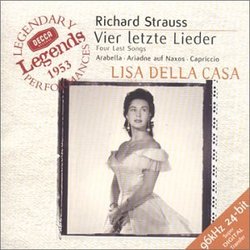 | Richard [1] Strauss, Heinrich Hollreiser, Karl Böhm Strauss: Four Last Songs, Arabella/Della Casa (Vier letzte Lieder) Genres: Pop, Classical |
Larger Image |
CD DetailsSimilarly Requested CDs
|
CD ReviewsThe last "word" on the Four Last Songs Daniel Reaver | Columbus, OH United States | 01/26/2008 (5 out of 5 stars) "Regardless of the mixed metaphor in the above title, it needs to be said: Lisa Della Casa's interpretation of the "Four Last Songs" has yet to be equaled, let alone surpassed. I became acquainted with her Strauss in high school through a Richmond lp (Decca/London's bargain label before London's STS), which btw, was also my introduction to Strauss's vocal and operatic music. Since that seminal experience, I've acquired many versions of the "Songs," among them, Flagstad and Furtwangler, Schwarzkoff with both Ackermann and her very special one with Szell, the great Janowitz and Karajan, the Norman and the Masur and my current rave, Fleming with Eschenbach. It's still Della Casa's benchmark performance by which the others can be judged. Her collaboration with Karl Bohm was born through both of them knowing Strauss (who died in 1949)and his desires for the performance of his music. Also included are the operatic excerpts, which are notable for the deep affinity that Della Casa had with the demanding Straussian roles. As Gerd Uekermann points out in his excellent notes, Della Casa's "name became synonymous with Arabella. . ." Included too are the Act I aria from "Ariadne auf Naxos" and the remarkable closing scene from "Capriccio." The sound for 1953 and '54 is excellent and Decca employed its best resources with the transfers. No Straussian would want to be without this disc. Daniel Reaver. " Lisa della Casa in her strongest music and best remastering Santa Fe Listener | Santa Fe, NM USA | 02/22/2010 (5 out of 5 stars) "Some reviewers seem to think that Bohm is brisk in his pacing of the Four Last Songs. I find that he rushes only the last one, Im Abendroth. More objectionable is Bohm's cramped phrasing and lack of expressive flexibility. The other timings don't feel too fast, even though they certainly aren't slow. For the record: Fruhling: Karajan/Schwarzkopf 3:01 Szell/ Schwarzkopf 3:46 Karajan/ Janowitz 4:03 Bohm/ della casa 3:19 Masur/ J. Norman 3:43 September: Karajan/Schwarzkopf 3:49 Szell/ Schwarzkopf 5:17 Karajan/ Janowitz 4:49 Bohm/ della casa 4:03 Masur/ J. Norman 5:26 Beim Schlafengehen: Karajan/Schwarzkopf 5:03 Szell/ Schwarzkopf 5:22 Karajan/ Janowitz 6:13 Bohm/ della casa 5:16 Masur/ J. Norman 6:05 Im Abendroth: Karajan/Schwarzkopf 6:47 Szell/ Schwarzkopf 8:20 Karajan/ Janowitz 7:05 Bohm/ della casa 6:00 Masur/ J. Norman 9:54 As these timings bear out, Bohm is radically fast in the final song and generally fast througout, though in league with Karajan and schwarzkopf in their live reading; Schwarzkopf's first studio recording with Otto Ackermann in mono was also generally brisk. I can second all the praise given to these vintage recordings from della Casa, whose silvery lyric soprano was heightened with a touch of inward melancholy that perfeclty suited her for Strauss. The Countess in Nozze di Figaro called upon the same reflective quality. In each recording the voice is forwardly placed compared to th orchestra, which is downright recessive in the Four Last Songs. Over the years I've found della Casa's interpretations placid, despite the voice's lovely feminine allure, and a later singger, Renee Fleming, outdoes her for hseer lustrousness and luxury of voice. But that doesn't take away from her unique status in the Fifties and Sixties. Della Casa sang Ariadne on stage, but her voice can barely reach deep enough -- she tiptoes around the bottom notes of 'Es gibt ein Reich,' and throughut the aria the conducting is cautious and carefu, no doubt to help the singer. In almost all of these items Elisabeth Schwarzkopf is preferable for intrpretation and ultimate artistry. Della Casa surpasses her in Arabella, her most famous Strauss role, but then, Schwarzkopf only recorded short excerpts in mono under Ackermann, so we don't know how she would have fared in her maturity. In perspective I'd place della Casa on a high plane with Seefried and Gueden among her rough contemporaries and with Janowitz ten years later." Perfect match! operalover | Australia | 12/20/2008 (5 out of 5 stars) "Strauss is not an easy conductor to sing as it requires a great deal of stamina, control to manage the high tessitura and heady tone. Della Casa's interpretation -the first studio recording of the work sets an example for the rest to follow. Consistently from beginning to end she pours forth luscious silvery reed tones that captures the enigmation of the pieces. Perhaps a little less profound in interpretation but the beauty of the voice is sheer joy. The ease to which she soars is incredible. The rest of the pieces are stunning but I would agree that the Monologue scena from Capriccio crowns this particular disc which the engineers have done exceptionally well in their remastering. There are other great Four Last songs recordings too that often match what Della Casa has delivered and apart from this most cherished disc, any Strauss lover cannot go without the following:
Schwarzkopf with Szell for sheer interpretation although less so for beauty of tone. Te Kanawa with Davis - the magnificence of the voice is stunning. In a way she parallels Della Casa in their choice of work- they were both exceptional in Strauss and Mozart. Not many people know of this recording. Norman with Masur- bigger than life and slower but gloriously vibrant. Janowitz- purity dominates and she gives the work an ethereal quality. Fleming with Eschenbach- devoid of most mannerisms this is Fleming's most charasmatic Strauss recording to date. M.Price with Abbado (live)- pity she never recorded it in studio with the likes of Kleiber but the live recording shows the sopranos gift for luminous tone and interpretation. Overall the standards for the work are exceptional and most past and present day sopranos have recorded the work but most of them apart from the afore-mentioned are not that memorable. But we should find joy in the many that are available to us. " |



